Jennifer Freitag's Blog, page 51
February 10, 2011
Dramatis Personae - Between Earth and Sky
 Liz, and I think Ara before her, posted fun Meet The Characters posts, complete with photos and all. Having nothing to do and nursing a bad headache, I blundered around looking for pictures of my own to make my own post. And I'm not going to offer any sort of apology or defense because I had fun.
Liz, and I think Ara before her, posted fun Meet The Characters posts, complete with photos and all. Having nothing to do and nursing a bad headache, I blundered around looking for pictures of my own to make my own post. And I'm not going to offer any sort of apology or defense because I had fun.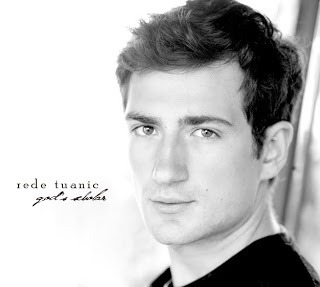 Rede Tuanic [ reed twan-ic ]
Rede Tuanic [ reed twan-ic ]Rede is the main character of Between Earth and Sky. He was born and raised in the small coastal village of Dunkerri in Northwest Britain, and from a very young age has pushed himself through the rigorous training to become a minister in the Church. His tutelage under the local brethren culminates in a drastic twist of fate when, on the eve of his last exam, he is taken captive by traders and sold as a slave in Arregaithel across the sea. Frank and sensitive, Rede is wise enough to rise to the new posting God has given him, while at the same time struggling in his heart for the lost souls in his new land. He earns the title of "Tuanic," 'one like the stag,' from his Arregaithel trainer because of his stalwart, passive, reserved demeanour. But as the manservant of the tribal prince, Rede's duties exact more of him than merely prayer and preaching, and the young man finds far more resting on his shoulders, and far more at stake, than he would have imagined.
 Allar [ al-ar ]
Allar [ al-ar ]Reared alongside Rede as his best friend, Allar too was aiming for the ministry when Rede's sudden capture tears them apart. Allar means well, but his friend's inexplicable departure leaves him scarred and callous against the unbelieving, and the young man's natural flippancy hardens into a dangerous hatred. In the name of God and the Kingdom of Heaven, Allar sets out to convert the unbelieving populace of Arregaithel or, if they will not believe, to kill them all and send them to the Hell where they belong. With his ardent beliefs clashing with Rede's, the two best friends find themselves suddenly pitted against each other with the lives of two tribes at stake.
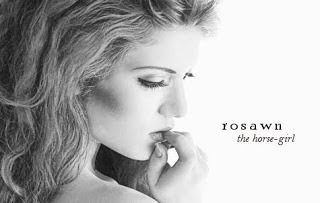 Rosawn [raw-shawn]
Rosawn [raw-shawn]Rosawn, a member of the Sperrae tribe, is one of the horse-girls, or priestesses, to the Earth Mother, their sacred goddess. She sports her own homely, yet fiery sort of beauty, not enough to make her the Skyprince's wife when it is time for him to take a woman - and she knows it. An orphan, she is content with her place among the other horse girls until she begins to have curious dreams about a man coming across the sea to them, a man with a countenance of light. Troubled and confused, she treasures these things in her heart until the day she chances upon a horseman's slave, a foreigner. Recognizing his face from her dreams, Rosawn's world quickly begins to unravel. With her heart in confusion and her sharp mind searching for an answer, Rosawn begins to sense a foreboding storm on the horizon, a storm in which the man in her vision is at the heart.
 Wing Skyprince [wing skyprince]
Wing Skyprince [wing skyprince]Son of Opr Skylord and Red Branch the Dragon Lady, Wing is the heir of the Sperrae throne. Beneath his honeyed, lazy laugh and friendly, mocking demeanour he keeps a sharp wit and a keen intellect. He is at almost all times easy-going, but he is not quick to forgive. Anyone approaching his bad side will be warned by an almost physical sensation of dark disapproval from the Skyprince. He is fond of Rede, finding in the young British slave more than a manservant, but a loyal friend. Unfortunately, though his affections are ready to include Rede, his paradigm is not ready to include Rede's notions about deity, damnation, and salvation - an unreadiness and unwillingness which pulls them both into a whirlpool of danger which will test both of their faiths and their friendship.
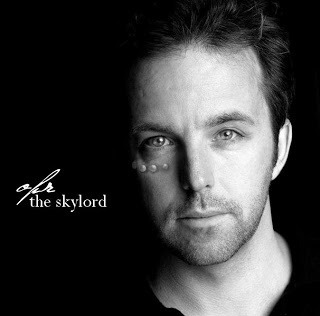 Opr Skylord [oh-pur skylord]
Opr Skylord [oh-pur skylord]Quiet, enigmatic, aloof from the goings-on around him, Opr Skylord is a hard man to know. As a teenager he ascended to the kingship of his people, becoming their 'skylord,' or representative of their Sky God. Strong and diplomatic, Opr has managed to keep the peace with their northern neighbours for some time. But as the memory of Opr's great ancestor begins to fade, and as Opr begins to grow older, the unrest begins again, and Rede's arrival in Arregaithel finds the communications tense with war on the horizon. Though Rede at first observes Opr as an eerie, uncanny shaman, as time progresses he begins to respect the man.
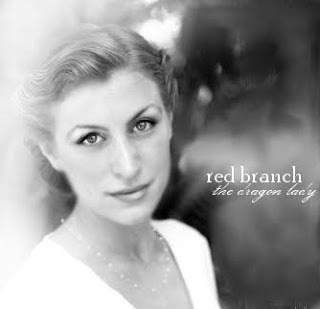 Red Branch [red branch]
Red Branch [red branch]Chief among the horse-girls of her time, and the most beautiful, there was no doubt that Opr would pick Red Branch to be his queen. Besides being pious and lovely, Red Branch is in every way a perfect match for her husband. She, like her husband, has the power of penetrative sight, the gift of thoughtful solitude, and the tutored, honeyed patience which comes with good breeding. Her title as the chief of the priestesses is the 'Earth Mother,' and as the Skylord's wife she earns the name 'Dragon Lady.' She takes a strong motherly interest in Rede from the outset, seeing in him a curious new religious order which intrigues her very much. As with Opr, it takes Rede some time to warm up to Wing's uncanny mother, though he guesses Red Branch senses his reluctance and mocks him. But even Red Branch could not see the importance of her son's manservant in the succeeding dangers of their lives.
 Terrigen [taireh-gen]
Terrigen [taireh-gen]Independent, sharp, beautiful and power-hungry, the Queen of the Orrae is strong enough to go toe-to-toe with her neighbouring rival. After an unsuccessful bid to take over the Sperrae tribe, Terrigen has been biding her time and building strength for a single strong blow against Opr. More uncanny than the Skylord and the Dragon Lady combined, Terrigen hurls herself not only into diplomatic relations to strengthen her power, but into the dark arts and the spiritual realm as well. With Allar as a pawn in her hands, with the whole force of the Orrae behind her, she emerges from her northern county to deliver the Sperrae a killing blow.
[ this is not a complete listing of the characters, I'm afraid, but it will have to do. also, as Liz and Ara pointed out, steal from me and die! if I manage to publish this (which I fully intend to) you may glean from it all the inspiration you want short of plagiarism. but until then, NO STEALING. or I'll talk to your mother about you. thanks! ]
Published on February 10, 2011 07:40
February 6, 2011
Quo Vadis?
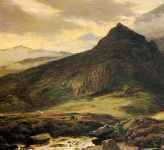 Where are you going, and do you know what it will be like when you get there? As to that, where are you now? These are questions writers must ask of their characters. Some writers are very skilled in delivering a nearly descriptionless story to the reader without the reader feeling as though anything at all were missing. The bulk of us scribblers don't usually attain that skill in word twistery, so we have to stick to the basics.
Where are you going, and do you know what it will be like when you get there? As to that, where are you now? These are questions writers must ask of their characters. Some writers are very skilled in delivering a nearly descriptionless story to the reader without the reader feeling as though anything at all were missing. The bulk of us scribblers don't usually attain that skill in word twistery, so we have to stick to the basics.Description. The amount will vary from writer to writer, from place to place. There are no hard and fast rules about how much description you should use. If, for instance, I were to mention a cloak, well, pfft, everyone knows what a cloak looks like, and Jenny would be very daft to go on for a decent-sized paragraph about it when all she needed to say was, Rede slung his cloak on and stabbed the brooch home. Done and done. The reader, cheered by the thought that Rede will now be unlikely to freeze in the cold, reads on without much more thought. But if I were to introduce the reader to a very intricate and symbolically important crown, I would be justified in taking some time off from the rest of the plot to inform the reader of what the crown looks like. The writer just has to know his priorities, and keep in mind what the reader needs to know and (also important) what the reader can put up with.
But the main thrust of my post today (this evening, rather) is about landscape. I spent an entire post a short white ago on weather, and knowing your weather where you are writing about. But equally as important, if not even more so, is knowing what your landscape looks like. Some people are good at this: landscapes spring into their minds without any help. ("Well, hurrah for you.") I know I'm not like this. Landscapes emerge as vague images, often in the form of heath (very boring), and it is with supreme effort that I remind my imagination that landscapes come in wildly changing forms and I need to be realistic. So Jenny, on one of those long Saturday afternoons in which nothing else was pressing her, flung herself into her chair and took the time to look up all those curious English terms for different landscapes. She had some surprises. She had some nasty shocks. She had an ache in her wrist by the time she was done writing in her Things Various English notebook. Here is what she managed to cull together:
Beck: (North England) a brook, especially a swiftly-running on, with steep banks; often running through "gills."
Burn: (Scotland, North England) a stream or rivulet from large streams to small rivers; "burna," "brunna," "bourne." - So Guy of Gisbourne is obviously Guy of the Gis Stream, which sounds dumb.
Carr: an area of fen or bog in which scrub, usually willow, has established itself.
Cirque: a bowl-shaped, steep-walled mountain basin caused by glacial movement; often containing a small round lake.
Coombe: a narrow valley or deep hollow, especially one enclosed on all but one side; "cwm," "combe."
Copse: a thicket of small trees or bushes; a small wood; "coppice."
Dale: (Yorkshire, Cumbria) an open, broad valley, usually in an area of low hills.
Dell: a small, wooded valley, vale; depression in the earth.
Down: (Norse) open, rolling upland chalk country with fairly smooth grassy slopes; from the Norse "dun" for "hill."
Fell: (Scotland, North England) a tract of upland moor, pasture, or thicket; a highland plateau.
Fen: low wetland, rich marsh.
Gill: (Yorkshire, Cumbria) a narrow valley; "ghyll."
Glen: a small, narrow, secluded U-shaped valley or gorge, often mountainous and wooded; Goidelic: gleann (Scottish/Irish Gaelic), gloin (Manx) - Brythonic: glyn (Welsh).
Hanger: a wood on a steep hillside, usually beech, growing on chalk in southern England.
Heath: a tract of level wasteland with sandy soil and scrubby vegetation; any member of the heather family.
Howe: (Scotland) a dell, a hollow.
Howe: (Norse) a hill, a knoll.
Massif: a cluster of hills, a compact portion of a mountain range containing one or more summits.
Moor: a very peaty tract of open wasteland, often overgrown with heath, common in high altitudes where drainage is poor.
Scar: a rocky cliff; a low or submerged rock in the sea.
Scree: a steep mass of rocky debris caused by landslides at the foot of a mountain; "talus."
Shaw: a strip of woodland between 15 and 50 feet wide.
Strath: (Scotland) a wide river valley; ystrad (Welsh).
Tarn: a small mountain lake or pool, usually in a cirque.
Tor: a rocky pinnacle; a bare peak of rocky mountain of hill; also the hill itself.
Upland: a range of hills or elevated mountainous plateaus.
This is, of course, a very short and slightly incomplete list. Many terms are merely repeats of others, used in different locations. But it is nice to know that when someone is talking about a glen, they aren't talking about a meadow (which was the impression I always got) by a deep gash in the ground covered in trees and moss with a river running through the bottom of it. So the moral of the story is to know where your characters are (vigilance, that's a virtue, right?) and be sure you are using the correct terms. These are obviously English terms. Know your countryside and the countrysides terms.
A caveat. Don't overwhelm the reader with terms. If I were to say of one of my Welsh characters, He dismounted and climbed down into the cwm with his hatchet in hand, the dark wolf-hackled shape of the coppice looming in front of him, how many people would know what I meant? It's fun to know the more obscure terms, "cwm" and "ghyll," but keep in mind the bulk of folk who are going to be reading. Don't lose them in a mass of overly period correct terminology. It would be far better for me to explain earlier on that my character was headed to the coppice to fell trees for fence making (this gives the reader an idea that a coppice is a stand of trees, at the very least), and I can use the perfectly acceptable term "combe" which the reader will at least vaguely be able to relate to, more so as I describe it detail as I move along.
But these terms can be used as spice! Spices aren't meant to be dumped on, but used wisely and sparingly to add flavour. Know your countryside, and know when to throw in a word your readers may not have heard before. Expand their minds and teach them too.
Published on February 06, 2011 19:18
January 13, 2011
When It Hurts, God Is
So Anna, over on Insanity Comes Naturally, posted a very heart-felt piece on the rubbishiness of a Christian supposing himself just too useless to live. She pulled on the age-old beginning of the Westminster Confession (we all know it, don't we?): What is the chief end of man? To glorify God and enjoy him forever. It seems like a question-and-answer that is as old as time (and it is, really), but it's as true today as it was then. And having to learn this truth, as Anna found out, for one's very own often hurts. It requires being led to the end of your prideful road and whirling in circles trying to chase the shadow that you think is your own worth, and staring down at your own empty clenching hands wondering why you don't possess anything of use...
...and then having your head lifted by the Almighty to look above and beyond to Christ, the author and finisher of our faith in whose image we are daily being shaped. This way we learn that all we think we are isn't, and all we dream to be sleeps in Christ, ready to be revealed on the last day. We despair because we cannot see what we long to see, and we see the wretchedness that we carry about in the body from day to day.
Anna dealt with the rising above this pain, this misplaced sense of humility. I want to deal with the pain that comes from realizing that our place is to glorify God in this life. You and I and all of us, the closer we draw to God's holiness, the more painfully we feel this coarsely-cobbled, tattered garment of our body rubbing wrong against our spirits, the more we feel the pressing darkness of this world. It's like being pressed through a bottle-neck: the closer we come to the thrown-wide glimmering gates of Heaven, the darker seems the night through which we walk. It hurts. The more we grow, the more it hurts.
But what a splendid agony! What marks of faith our scars become! When it hurts, it means that God is working in us. When it hurts, it means we look unto a king and country that we can call our own. When it hurts, it means that all is working from glory to glory within us. When it hurts, it is well with my soul. When sin and death and the dark grate against our spirits, when we feel their presence as an agony to our Godward-reaching souls, then we know we are born of the Spirit.

...and then having your head lifted by the Almighty to look above and beyond to Christ, the author and finisher of our faith in whose image we are daily being shaped. This way we learn that all we think we are isn't, and all we dream to be sleeps in Christ, ready to be revealed on the last day. We despair because we cannot see what we long to see, and we see the wretchedness that we carry about in the body from day to day.
Anna dealt with the rising above this pain, this misplaced sense of humility. I want to deal with the pain that comes from realizing that our place is to glorify God in this life. You and I and all of us, the closer we draw to God's holiness, the more painfully we feel this coarsely-cobbled, tattered garment of our body rubbing wrong against our spirits, the more we feel the pressing darkness of this world. It's like being pressed through a bottle-neck: the closer we come to the thrown-wide glimmering gates of Heaven, the darker seems the night through which we walk. It hurts. The more we grow, the more it hurts.
But what a splendid agony! What marks of faith our scars become! When it hurts, it means that God is working in us. When it hurts, it means we look unto a king and country that we can call our own. When it hurts, it means that all is working from glory to glory within us. When it hurts, it is well with my soul. When sin and death and the dark grate against our spirits, when we feel their presence as an agony to our Godward-reaching souls, then we know we are born of the Spirit.
Blessed are the poor in spirit, for theirs is the kingdom of Heaven.
Blessed are they that mourn, for they shall be comforted.
Blessed are the meek, for they shall inherit the earth
Blessed are they which do hunger and thirst after righteousness, for they shall be filled.
Blessed are the merciful, for they shall obtain mercy.
Blessed are the pure in heart, for they shall see God.
Blessed are the peacemakers, for they shall be called the children of God.
Blessed are they which are persecuted for righteousness' sake, for theirs is the kingdom of heaven.
Blessed are ye, when men shall revile you, and persecute you, and shall say all manner of evil against you falsely, for my sake.
Rejoice, and be exceeding glad: for great is your reward in heaven: for so persecuted they the prophets which were before you.
Published on January 13, 2011 06:23
January 11, 2011
Light Unconquerable
 There is an ancient Eastern religion called Mithraism, whose details no one has really worked out yet, but which possessed one peculiarity of note. They, like many pagans, revered the sun. This is where our December 25th became important, that the adherents of Mithraism would watch the sun 'die,' and come to life again. The Romans, borrowing this religion, called it the Sol Invictus: the Unconquered Sun.
There is an ancient Eastern religion called Mithraism, whose details no one has really worked out yet, but which possessed one peculiarity of note. They, like many pagans, revered the sun. This is where our December 25th became important, that the adherents of Mithraism would watch the sun 'die,' and come to life again. The Romans, borrowing this religion, called it the Sol Invictus: the Unconquered Sun.Mithraism aside (because I am not a pagan), I found this name fascinating. The Unconquered Sun: a light which no length or depth of darkness can quench, an immortal source of radiance, a sentient light. This concept, hastily torn from Mithraism, was dragged off to my mental lair for me to brood over like some dragon brooding over mounds of gold. I have come across many such almost-truths in various pagan religions, but this one topped them all.
Of course we are familiar with the idea of an undying, eternal Light - our God is light and the father of lights, in whom there is no change or shifting shadow. This is a truth we hold to be self-evident, an indisputable truth of our very lives. He is the light of our souls. But this unexpected phrasing, this freak twist of man's eye as he gropes for the light himself, this idea of the "Unconquered Sun" shed, as it were, a whole new light on my understanding. The whole title is infused with an indomitable sense of hope, a rock-solid assurance of goodness and warmth and life.
I don't know about some, but I know what it is like to be afraid of the dark. Not just the dark, but The Dark. I know what it is like to sit in the long dark cold of despair and wonder if Christ's light would ever come touch my withered petals. So when I heard the words 'sol invictus,' something in me answered with a shout. Yes! I have known this truth for years upon years, but condensed into two words - only two words, yet so powerful - I found my legs again. No matter how long the dark, or how deep the dark,
Thine eye diffused a quickening ray;
I woke; the dungeon flamed with light.
My chains fell off, my heart was free,
I rose, went forth, and followed thee.
So a story began to shape itself in my mind. There was a man called Tabby, Tabby O'Connor, and place called the Land of Nod, and a great deal of darkness and bastions of light, and the whole long struggle of being a light in a dark place began to be a tale. It's still percolating, but perhaps Megan will help me get it sorted out.
It is perhaps my own experience which draws me toward phrases like "Sol Invictus," or inspires titles like "The Fire Trinity" or "A Countenance of Light." The theme is quite strong in Between Earth and Sky. It seems almost unavoidable to me: it is so very crucial to my own life as a Christian (which, spiritually, is embarrassingly redundant). In my darkest night I have this unfailing light within me, and I can't avoid touching on this in my works. When I write 'dark' it is only because I want to show that the Light is unconquerable, that the highest, coldest Atlantic waves of wickedness dash to useless pieces against it - and turn to silver glass and shine. The one side of the coin is that this Light is unconquerable; the other is that this Light conquers all.
There, peeping among the cloud-wrack above a dark tor high up in the mountains, Sam saw a white star twinkle for a while. The beauty of it smote his heart, as he looked up out of the forsaken land, and hope returned to him. For like a shaft, clear and cold, the thought pierced him that in the end the Shadow was only a small and passing thing: there was light and high beauty forever beyond its reach. The Lord of the Rings
Published on January 11, 2011 11:22
January 6, 2011
Wordles!
After a long morning of cleaning the church and putting out a local homeschool newsletter, I was poking about some other girls' blogs, and I found Wordle, a site for making word clouds. I had seen these sorts of things around, but suddenly I found I could make one of my own. Having better things to do, but not having the immediate energy or will-power to do them (i.e. I was lazy), I made two 'wordles,' one for Between Earth and Sky and one for Adamantine.

Adamantine! This was my first one, and I had a lot of fun skimming through the manuscript picking out all the pertinent words. (And now I want to make a silver-grey dress with dark crimson ribbons, because the colour-combination is just so stunning!)

And Between Earth and Sky. This one was harder to choose colours for, but I think in the end I got it. Colour combinations are difficult. Grey-blues for coastal skies, blue for waters, dark greens for turf and, I don't know, purple for the heather? Sounds right. Sounds like I took the time to think this out.
Enjoy my sojourn into Lazyville. Now it's time to clean the shower. Happy scribbles, all!

Adamantine! This was my first one, and I had a lot of fun skimming through the manuscript picking out all the pertinent words. (And now I want to make a silver-grey dress with dark crimson ribbons, because the colour-combination is just so stunning!)

And Between Earth and Sky. This one was harder to choose colours for, but I think in the end I got it. Colour combinations are difficult. Grey-blues for coastal skies, blue for waters, dark greens for turf and, I don't know, purple for the heather? Sounds right. Sounds like I took the time to think this out.
Enjoy my sojourn into Lazyville. Now it's time to clean the shower. Happy scribbles, all!
Published on January 06, 2011 12:42
January 4, 2011
The Human Character
 Undoubtedly, when I say "the human character" you will understand me to mean something like "a character which is not an elf, which is not a hobgoblin or a fairy or an animal - a character which is a human being." And in a sense, you would be correct. It's the natural thing to deduct from such a title. But what I mean is more than that, more splendid and rather deeper than just "a human." I mean THE Human. I mean Man.
Undoubtedly, when I say "the human character" you will understand me to mean something like "a character which is not an elf, which is not a hobgoblin or a fairy or an animal - a character which is a human being." And in a sense, you would be correct. It's the natural thing to deduct from such a title. But what I mean is more than that, more splendid and rather deeper than just "a human." I mean THE Human. I mean Man.Anthropology, in a biblical light, is an unavoidable course for me, but neither is it an unpleasant one. Biblically, Man is the greatest of all creation, the noblest, the most complex: he is wildly fantastic at an essential level, the place in which rational spirit and physical body come together into a single whole. He is the lord of creation, he is the fallen king, he is the redeemed figure of clay.
But what does all this pedigree of Man have to do with writing? Well, we mustn't put the cart in front of the horse. IT doesn't necessarily have something to do with WRITING, but WRITING must have something to do with IT. As in all things, philosophy colours actions both physical and intellectual. At this point, I am discussing the intellectual, and I trust it is well worth at least a brief look-over.
From the vantage point of a Christian mind, when I handle the Human Character, I must take into account Hamartiology and Soteriology: the studies of Sin and of Salvation. These impact the Nature of the Human Character. In two diagrams we observe the ripple effect of these two truths: Man sinned, creation fell; Man was saved, creation has been redeemed. At a fundamental level, this will be an undercurrent to Christian writing both Fictional and Non-Fictional. These two circumstances are as unavoidable to Christian philosophy as Anthropology is to my own personal study. The Human Character is going to be impacted by both of these camps all throughout its tenure in any given story: at first the Human Character may be in the Wholly Sinful camp, at which points its nature is to sin; and later on the Human Character may be in the Redeemed camp, at which point its nature is to be righteous, but is still combating, from within and without, the tendencies to sin.
Now, whether the thrust of your story is to chart this course or not, you must at least touch upon the undercurrent of the Nature of the Human Character. I have read characters in stories that professed to have one Nature (a redeemed one) and acted for all the world like die-hard sinners. Why? It is possible that the author didn't take the time to look at the Nature of the Human Character, and thus failed to pull off a well-constructed, realistic representation of Man.
A lot of people tend to take the approach of observing one Nature give way to the next. And that is very good. But so many people do that I choose, myself, to take a rather different tact: I observe the two Natures in complete opposition of each other. This is also biblical, and it is a tact more sustainable over a story-arch.
For our struggle is not again flesh and blood, but against the rulers, against the powers, against the world forces of this darkness, against the spiritual forces of wickedness in the heavenly places.
I have found David My servant; with My holy oil I have anointed him, with whom My hand will be established; my arm also will strengthen him. The enemy will not deceive him, nor the son of wickedness afflict him. But I shall crush his adversaries before him, and strike those who hate him. My faithfulness and My lovingkindness will be with him, and in My name his horn will be exalted. I shall also set his hand on the sea and his right hand on the rivers. He will cry to Me, 'You are my Father, my God, and the rock of my salvation.' I also shall make him My firstborn, the highest of the kings of the earth. My lovingkindness I will keep for him forever, and My covenant shall be confirmed to him. So I will establish his descendants forever and his throne as the days of heaven.
This is the Nature of the Redeemed Human Character: to do good always, to love the light and everything that is in the light, to love God and to obey him forever. This is an end to which I push in my own writing: to get a clearer glimpse through the obscuring darkness of what that Nature looks like, to break down the encroaching hum-drum roll of life and see the colossus that is the Human Character. This is not an easy thing to do. We easily lose sight of Man when we are faced with the overly large woman at the check-out at the store, or the man singing horribly off-key in the pew behind us at church. Mankind is just kind of flimsy and shabby and rather ridiculous.
But is it? Is it really? Aren't we confusing this earthen vessel for the Nature - no, the Essence - of Man? Let's go deeper. (Deeper, Jenny? Yes, deeper.) We touched on the Nature of the Human Character. Now we're going to get to the Essence of the Human Character, that which makes the Human Character what it is, and nothing else.
Throughout history, actions against Man such as murder have always been considered crimes, not against society, but against a Natural Law, a law which is fixed, immovable, which has always been, and which no one has refuted with success. Why? The Human Character is universally corrupt save where it has been Redeemed. What is to say that a wholesale slaughter of the Corrupt Human Character by itself is not a bad thing? It's because there is more to the Human Character than its mere Nature. 'Man' is not an attribute as something like 'mammal' or 'reptile' is: 'Man' is what the Human Character irreducibly is. This is his Essence. But what is his Essence? What makes it any different from any other Essence? What makes Man, even in his Corrupt Nature, to be something worth keeping around on at least a temporal level? What is it at the core of his being, unchanged by corruption, which still makes him Man?
The Image of God.
This, we could call it, is the Irreducible Minimum of Man's Existence: that he is made in God's image. Without this, he is no longer Man. This is why Man is the lord of creation. He is the best and the brightest by virtue of his archetype. This is Human. This cannot be reduced or destroyed even through his own corruption, for when a thing changes essence, it itself no longer exists: therefore, it never changed at all. All human dignity, all morality, must hinge upon Man being what he is, made in the image of God.
We're on our way out from the philosophical depths into the pragmatic application. After all that, we're coming back around to writing. How does this impact my writing? I look on the Human Character as something fantastic. Not unbelievably fantastic, not mythical: and yet having the properties of the mythical, and even ends which are almost too much to believe. This is what I like to touch on in my writing, the renewed Human Character, of which Christ is the first-fruits: the lonesome hero who is not alone, the unearthly and at the same time far more elemental figure, terrible but never afraid, the great colossus: Man.
Published on January 04, 2011 07:02
January 3, 2011
Jenny's Five Favourite Books
I have been meaning to get around to doing this. It's the sort of thing I know I like to know about people. You can tell a lot about a person by what they read- or what they don't read, as to that. Anyway: the first three are easy to assemble for several reasons, not the least of which being I actually know where I put them away when I was last finished with them. The last two books are less easy to cull from the literary ranks in my house. Well! I will be honest, if a little narrow-minded, in my selection.
1. The Silver Branch by Rosemary Sutcliff.
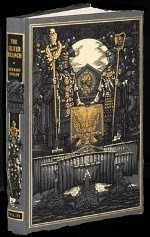 "When they accidentally uncover a plot against the British emperor Carausius, a young army surgeon and his soldier cousin are caught up in a maze of intrigue that leads them first to exile at a distant outpost and finally into an underground organization of secret agents in the service of Rome."
"When they accidentally uncover a plot against the British emperor Carausius, a young army surgeon and his soldier cousin are caught up in a maze of intrigue that leads them first to exile at a distant outpost and finally into an underground organization of secret agents in the service of Rome."
Can it get any better than this? Jenny doubts it. For years Justin and Flavius have been the best companions in literature I've ever wanted. Added to Sutcliff's natural ability to bring Roman-Britain to life with her wide spaces of forbidding Scottish moorland and her magical, brief glimpses of dawn by the sea, ginger-headed Flavius and shy, stuttering Justin give this historical fictional all the pulsing life it could ever need. I could go on. I could go on and on. I could give the whole plot away, but suffice it to say that I have yet to encounter such a vivid combination of tatterdemalion yet fitting figures in a story so charged with vitality, simply, yet elegant, and worthy of being read to tatters.
2. The Great Divorce by C.S. Lewis
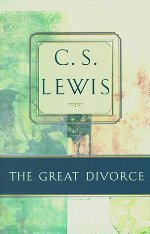 A strange bus-ride of Ghosts from Hell to visit Heaven. Written today, written by anyone else, it might come off as presumptuous. Who dares write on Heaven - or even Hell, for that matter? But Lewis isn't so much writing on them, as about them. You'll all be familiar with the phrase "The Kingdom of Heaven is like..." In a way, Lewis' approach is very like that with his discourses between the Ghosts and the Bright People. I find myself kicking myself over and over as I read this book, wondering why Lewis could see the profoundly obvious, and why I was too dumb to see it myself without his help. But still, I like to hear him say it.
A strange bus-ride of Ghosts from Hell to visit Heaven. Written today, written by anyone else, it might come off as presumptuous. Who dares write on Heaven - or even Hell, for that matter? But Lewis isn't so much writing on them, as about them. You'll all be familiar with the phrase "The Kingdom of Heaven is like..." In a way, Lewis' approach is very like that with his discourses between the Ghosts and the Bright People. I find myself kicking myself over and over as I read this book, wondering why Lewis could see the profoundly obvious, and why I was too dumb to see it myself without his help. But still, I like to hear him say it.
"What do you keep on arguing for? I'm only telling you the sort of chap I am. I only want my rights. I'm not asking for anybody's bleeding charity."
"Then do. At once. Ask for the Bleeding Charity. Everything here is for the asking and nothing can be bought."
3. The Gammage Cup by Carol Kendall
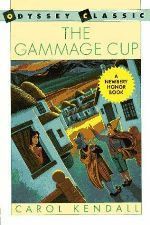 "Say wha...? Jenny, it's a kid's book!"
"Say wha...? Jenny, it's a kid's book!"
Nope, wrong. That's what Carol Kendall thought when she wrote it. She was wrong too. Sorry. The Gammage Cup ranks up there with Winnie-the-Pooh in its ageless beauty. This book makes me laugh, it makes me cry, it makes me wonder in amazement at how sophisticated, and yet how unassuming it is. Minnipins! Minnipins arguing over the colours of cloaks and doors! What talent can wrap up a reader in such petty squabbles, and then touch with a sense of dreaded urgency as the pettiness falls away in the face of true danger! Every character is bursting with life, his or her own personality, the whole setting is fresh and unforced. It struck me the other day that one of Kendall's characters probably, quite without my knowing it, influenced one of the best characters I've written yet. Huzzah!
4. The Silver Chair by C.S. Lewis
 Yes, Jenny has a thing with C.S. Lewis. You'll get used to it, don't worry. It would also appear that she has an affinity for silver, and that, too, is true. But this is rubbish and bunny-rabbit trails. I will get on with myself. The Silver Chair is such a fun book, especially because of the profound discourses between the children and Aslan. And Jill, who is my favourite English character, makes her debut here. Puddleglum is a brick, and a real hero. Lewis infuses a delightfully medieval atmosphere into this story without weighing it down. Mingling the seriousness of the children's quest with moments of light-hearted fun, Lewis pulled off a wonderful little book here.
Yes, Jenny has a thing with C.S. Lewis. You'll get used to it, don't worry. It would also appear that she has an affinity for silver, and that, too, is true. But this is rubbish and bunny-rabbit trails. I will get on with myself. The Silver Chair is such a fun book, especially because of the profound discourses between the children and Aslan. And Jill, who is my favourite English character, makes her debut here. Puddleglum is a brick, and a real hero. Lewis infuses a delightfully medieval atmosphere into this story without weighing it down. Mingling the seriousness of the children's quest with moments of light-hearted fun, Lewis pulled off a wonderful little book here.
"But," said Eustace, looking at Aslan. "Hasn't he - er - died?"
"Yes," said the Lion in a very quiet voice, almost (Jill thought) as if he were laughing. "He has died. Most people have, you know. Even I have. There are very few who haven't."
5. The Last Battle by C.S. Lewis
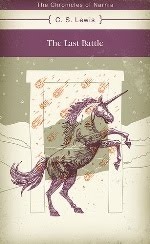 Again? Jenny! For pete's sake... Yes, again. For the same reason I like Justin and Flavius, I adore Tirian and Jewel and their steadfast love for each other. Not only that, but together they share an unfailing (if sometimes misunderstanding) love for Aslan, and they are willing to fight to the death to preserve the truth. That's the sort of hero that is worth reading about. And Lewis, though he brings Narnia to an end, manages to do so without the bitter taste of loss, for he understands that all creation will be made anew by Heaven's breath, and nothing worth keeping in Heaven's eyes will be lost.
Again? Jenny! For pete's sake... Yes, again. For the same reason I like Justin and Flavius, I adore Tirian and Jewel and their steadfast love for each other. Not only that, but together they share an unfailing (if sometimes misunderstanding) love for Aslan, and they are willing to fight to the death to preserve the truth. That's the sort of hero that is worth reading about. And Lewis, though he brings Narnia to an end, manages to do so without the bitter taste of loss, for he understands that all creation will be made anew by Heaven's breath, and nothing worth keeping in Heaven's eyes will be lost.
Then Aslan turned to them and said: "You do not yet look so happy as I mean you to be."
Lucy said, "We're so afraid of being sent away, Aslan. And you have sent us back to our own world so often."
"No fear of that," said Aslan. "Have you not guessed?"
Their hearts leapt, and a wild hope rose within them.
"There was a real railway accident," said Aslan softly. "Your father and mother and all of you are - as you used to call it in the Shadowlands - dead. The term is over: the holidays have begun. The dream is ended: this is the morning."
And as He spoke, He no longer looked to them like a lion; but the things that began to happen after that were so great and beautiful that I cannot write them. And for us this is the end of all the stories, and we can most truly say that they all lived happily ever after. But for them it was only the beginning of the real story. All their life in this world and all their adventures in Narnia had only been the cover and the title page: now at last they were beginning Chapter One of the Great Story which no one on earth has read: which goes on forever: in which every chapter is better than the one before.
1. The Silver Branch by Rosemary Sutcliff.
 "When they accidentally uncover a plot against the British emperor Carausius, a young army surgeon and his soldier cousin are caught up in a maze of intrigue that leads them first to exile at a distant outpost and finally into an underground organization of secret agents in the service of Rome."
"When they accidentally uncover a plot against the British emperor Carausius, a young army surgeon and his soldier cousin are caught up in a maze of intrigue that leads them first to exile at a distant outpost and finally into an underground organization of secret agents in the service of Rome."Can it get any better than this? Jenny doubts it. For years Justin and Flavius have been the best companions in literature I've ever wanted. Added to Sutcliff's natural ability to bring Roman-Britain to life with her wide spaces of forbidding Scottish moorland and her magical, brief glimpses of dawn by the sea, ginger-headed Flavius and shy, stuttering Justin give this historical fictional all the pulsing life it could ever need. I could go on. I could go on and on. I could give the whole plot away, but suffice it to say that I have yet to encounter such a vivid combination of tatterdemalion yet fitting figures in a story so charged with vitality, simply, yet elegant, and worthy of being read to tatters.
2. The Great Divorce by C.S. Lewis
 A strange bus-ride of Ghosts from Hell to visit Heaven. Written today, written by anyone else, it might come off as presumptuous. Who dares write on Heaven - or even Hell, for that matter? But Lewis isn't so much writing on them, as about them. You'll all be familiar with the phrase "The Kingdom of Heaven is like..." In a way, Lewis' approach is very like that with his discourses between the Ghosts and the Bright People. I find myself kicking myself over and over as I read this book, wondering why Lewis could see the profoundly obvious, and why I was too dumb to see it myself without his help. But still, I like to hear him say it.
A strange bus-ride of Ghosts from Hell to visit Heaven. Written today, written by anyone else, it might come off as presumptuous. Who dares write on Heaven - or even Hell, for that matter? But Lewis isn't so much writing on them, as about them. You'll all be familiar with the phrase "The Kingdom of Heaven is like..." In a way, Lewis' approach is very like that with his discourses between the Ghosts and the Bright People. I find myself kicking myself over and over as I read this book, wondering why Lewis could see the profoundly obvious, and why I was too dumb to see it myself without his help. But still, I like to hear him say it."What do you keep on arguing for? I'm only telling you the sort of chap I am. I only want my rights. I'm not asking for anybody's bleeding charity."
"Then do. At once. Ask for the Bleeding Charity. Everything here is for the asking and nothing can be bought."
3. The Gammage Cup by Carol Kendall
 "Say wha...? Jenny, it's a kid's book!"
"Say wha...? Jenny, it's a kid's book!"Nope, wrong. That's what Carol Kendall thought when she wrote it. She was wrong too. Sorry. The Gammage Cup ranks up there with Winnie-the-Pooh in its ageless beauty. This book makes me laugh, it makes me cry, it makes me wonder in amazement at how sophisticated, and yet how unassuming it is. Minnipins! Minnipins arguing over the colours of cloaks and doors! What talent can wrap up a reader in such petty squabbles, and then touch with a sense of dreaded urgency as the pettiness falls away in the face of true danger! Every character is bursting with life, his or her own personality, the whole setting is fresh and unforced. It struck me the other day that one of Kendall's characters probably, quite without my knowing it, influenced one of the best characters I've written yet. Huzzah!
4. The Silver Chair by C.S. Lewis
 Yes, Jenny has a thing with C.S. Lewis. You'll get used to it, don't worry. It would also appear that she has an affinity for silver, and that, too, is true. But this is rubbish and bunny-rabbit trails. I will get on with myself. The Silver Chair is such a fun book, especially because of the profound discourses between the children and Aslan. And Jill, who is my favourite English character, makes her debut here. Puddleglum is a brick, and a real hero. Lewis infuses a delightfully medieval atmosphere into this story without weighing it down. Mingling the seriousness of the children's quest with moments of light-hearted fun, Lewis pulled off a wonderful little book here.
Yes, Jenny has a thing with C.S. Lewis. You'll get used to it, don't worry. It would also appear that she has an affinity for silver, and that, too, is true. But this is rubbish and bunny-rabbit trails. I will get on with myself. The Silver Chair is such a fun book, especially because of the profound discourses between the children and Aslan. And Jill, who is my favourite English character, makes her debut here. Puddleglum is a brick, and a real hero. Lewis infuses a delightfully medieval atmosphere into this story without weighing it down. Mingling the seriousness of the children's quest with moments of light-hearted fun, Lewis pulled off a wonderful little book here."But," said Eustace, looking at Aslan. "Hasn't he - er - died?"
"Yes," said the Lion in a very quiet voice, almost (Jill thought) as if he were laughing. "He has died. Most people have, you know. Even I have. There are very few who haven't."
5. The Last Battle by C.S. Lewis
 Again? Jenny! For pete's sake... Yes, again. For the same reason I like Justin and Flavius, I adore Tirian and Jewel and their steadfast love for each other. Not only that, but together they share an unfailing (if sometimes misunderstanding) love for Aslan, and they are willing to fight to the death to preserve the truth. That's the sort of hero that is worth reading about. And Lewis, though he brings Narnia to an end, manages to do so without the bitter taste of loss, for he understands that all creation will be made anew by Heaven's breath, and nothing worth keeping in Heaven's eyes will be lost.
Again? Jenny! For pete's sake... Yes, again. For the same reason I like Justin and Flavius, I adore Tirian and Jewel and their steadfast love for each other. Not only that, but together they share an unfailing (if sometimes misunderstanding) love for Aslan, and they are willing to fight to the death to preserve the truth. That's the sort of hero that is worth reading about. And Lewis, though he brings Narnia to an end, manages to do so without the bitter taste of loss, for he understands that all creation will be made anew by Heaven's breath, and nothing worth keeping in Heaven's eyes will be lost. Then Aslan turned to them and said: "You do not yet look so happy as I mean you to be."
Lucy said, "We're so afraid of being sent away, Aslan. And you have sent us back to our own world so often."
"No fear of that," said Aslan. "Have you not guessed?"
Their hearts leapt, and a wild hope rose within them.
"There was a real railway accident," said Aslan softly. "Your father and mother and all of you are - as you used to call it in the Shadowlands - dead. The term is over: the holidays have begun. The dream is ended: this is the morning."
And as He spoke, He no longer looked to them like a lion; but the things that began to happen after that were so great and beautiful that I cannot write them. And for us this is the end of all the stories, and we can most truly say that they all lived happily ever after. But for them it was only the beginning of the real story. All their life in this world and all their adventures in Narnia had only been the cover and the title page: now at last they were beginning Chapter One of the Great Story which no one on earth has read: which goes on forever: in which every chapter is better than the one before.
Published on January 03, 2011 05:53
December 28, 2010
Weather: It's Fickle, and So Are You
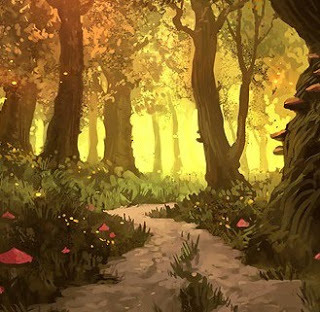 I'm sure we've all made this mistake before, but it doesn't make it any less embarrassing when we're called out on it. One minute our characters are strolling down a lane of glorious golden twilight toward the setting sun, and the next moment ominous clouds are pressing their weighty bulk upon the characters' heads.
I'm sure we've all made this mistake before, but it doesn't make it any less embarrassing when we're called out on it. One minute our characters are strolling down a lane of glorious golden twilight toward the setting sun, and the next moment ominous clouds are pressing their weighty bulk upon the characters' heads.Wait.
What? It was sunny just a minute ago.
Oh.
Right. My bad.
I distinctly remember having my characters sitting down under the shade of a tree on a completely overcast day. I am sure the problem is linked directly to Disney movies: we like to unconsciously assume that the weather is linked to the moods of the characters or the various levels of urgency developing in the plot. But we simply can't do that. The weather is a character all its own, and you have to not only let it do its own thing, but you have to keep track of it too. Of course, you're perfectly allowed to make the weather do what you want to further the plot of your story. Would she have ever run into that cave and found the magic crystal if a thunderstorm had not broken right over the forest just then? Would he have thought to look in that high cupboard if a shaft of light had not come through the window and shone like the finger of an angel at it? But be careful you don't overdo it. It can't always rain when your character is gloomy, it can't always be gloriously bright when your character is merry. Bilbo himself pointed out that it isn't all hay-rides in May sunshine. Weather happens.
Know your weather patterns. What time of the year is it? What sort of climate is your story set in? You don't need to go as far as mapping out air currents if you would really rather not. I know I wouldn't. But make sure you are clear on seasons, weather-patterns, and temperatures. You can't have your characters suddenly beating against a drenching gale in the middle of a long dry summer, or seeing wildflowers in a field in the middle of December. And believe me, I've done this before. If you happen to enjoy writing British-type climates, the way I do, Roman-Britain.org has an excellent and amusing page here on the weather throughout the year on the island. This will give you a narrower field on what to expect during any given month.
If you don't like Britain, you're on your own.
As far as any given day is concerned, you need to not only know the overarching patterns of weather throughout the year, as you write you need to keep track of what the weather is currently. In Between Earth and Sky I have a slight reprieve because the tribe in which Rede lives is coastal, and coastal weather is notoriously willful. If I want a sunny morning, I can get one - for about two hours - and then I can roll in a nice dense cloud-cover if I like. But regardless, I can't have Rede driving a chariot through sunny glades of blooming cherry and a page later be descending a hillside in which the heather is all blurred to lavender-grey by the shadows of the thick clouds. Pay attention to your weather. Realistically, weather happens totally regardless of the little petty joys and toils of mankind. We all understand this. Make sure your story understands it too.
That's all for today, folks. Happy scribbles!
Published on December 28, 2010 06:44
December 27, 2010
Christmas Books
I had a most delightful Christmas, I am very glad to say. All the book signings leading up to Christmas went marvelously, my Christmas shopping and preparations went smoothly, and the holiday itself was wonderful. We had a white Christmas! It is my understanding that that hasn't happened in nearly a generation here. South Carolina snows, in my neck of the woods, rarely last beyond twenty-four hours, but we still have some pretty patches of snow clinging on with valiant swan-white hearts. Lovely presents were exchanged among the family, though my niece and nephew, who are both on the young side of youthful, got a bit overwhelmed with all the "Come here and open this. Go there and open that."
But that's all boring stuff that no one wants to hear about from me. "Where's the writing? Where's the news on these books your post title seems so keen about? Get on with it, Jenny. Are you having us on?" All right, all right, here I get. You know how much I love talking about books. Here is what I got (or what my husband Tim got, which is more or less the same thing).
 My dear friend Anna sent me a lovely Puritan Paperback copy of Richard Sibbes' Glorious Freedom. We both have fond memories of this book, though mine are by proxy at the moment since I haven't read it yet. Over the summer she spent time with her grandmother, and she would often spend the hour sitting on the porch with one of my letters and Mr Sibbes, hours of bliss and sunshine. So though this isn't the exact book, its pages are infused with the memories of letters and sunshine and maybe even whiffs of tea. She wrote as much (and more, but such things are too precious to tell to all) in the inside flap of my book so that, years from now when I have passed on and my book has not, someone will pick it up and read it and wonder "Who were these young women, and what did they mean, and what were these glimpses of heaven that they caught between the lines of each other's letters?" Such is the power of the written word.
My dear friend Anna sent me a lovely Puritan Paperback copy of Richard Sibbes' Glorious Freedom. We both have fond memories of this book, though mine are by proxy at the moment since I haven't read it yet. Over the summer she spent time with her grandmother, and she would often spend the hour sitting on the porch with one of my letters and Mr Sibbes, hours of bliss and sunshine. So though this isn't the exact book, its pages are infused with the memories of letters and sunshine and maybe even whiffs of tea. She wrote as much (and more, but such things are too precious to tell to all) in the inside flap of my book so that, years from now when I have passed on and my book has not, someone will pick it up and read it and wonder "Who were these young women, and what did they mean, and what were these glimpses of heaven that they caught between the lines of each other's letters?" Such is the power of the written word.
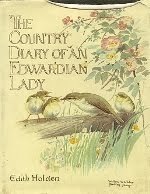 Another lovely vintage book I received was this, The Country Diary of an Edwardian Lady. It may be recalled that I have been researching British plants through the help of W. Keble Martin's The Concise British Flora in Colour. Well! Given even a passing knowledge of the expansive and wild glory of a British landscape, even the most forbidding, it is hardly surprising that a young lady such as Edith Holden could contrive to put such lovely observations and illustrations on paper. She filled this book up on observations throughout the year, jotting down what was blooming when, where, giving charming paintings to aid the words in bringing the Edwardian countryside to life. She wrote down many poems which suited the occasion, and even included many local observations on the months, such as their more ancient origin of name and various local festivities. For a girl of my interests, it was just the thing. Also, the book is elderly and smells of deliciousness.
Another lovely vintage book I received was this, The Country Diary of an Edwardian Lady. It may be recalled that I have been researching British plants through the help of W. Keble Martin's The Concise British Flora in Colour. Well! Given even a passing knowledge of the expansive and wild glory of a British landscape, even the most forbidding, it is hardly surprising that a young lady such as Edith Holden could contrive to put such lovely observations and illustrations on paper. She filled this book up on observations throughout the year, jotting down what was blooming when, where, giving charming paintings to aid the words in bringing the Edwardian countryside to life. She wrote down many poems which suited the occasion, and even included many local observations on the months, such as their more ancient origin of name and various local festivities. For a girl of my interests, it was just the thing. Also, the book is elderly and smells of deliciousness.
 I am sure it has come up that I am reading Charles Spurgeon's Morning by Morning. For Christmas, I got a gorgeous little black leather bound copy of both Morning by Morning and Evening by Evening. I am still only reading the morning bit, because I read my Bible in the evening before bed and by the time I being my landing cycle, it's already late. I will most likely switch once I have finished the morning readings. All the same, I had been wanting Evening by Evening, and now I've got both - all the more felicitous because my copy of Morning by Morning is my mother's, not mine. I am not usually one for 'devotions', as it were, for they so easily become a sort of rite for the soul. But Spurgeon, at least, has designs to focus the wayward soul upon the Constant of Christ, so that when we rise up and when we lie down we will be fixed on him always, and keep his words in our hearts. My thanks go to my in-laws and to Mr Spurgeon himself.
I am sure it has come up that I am reading Charles Spurgeon's Morning by Morning. For Christmas, I got a gorgeous little black leather bound copy of both Morning by Morning and Evening by Evening. I am still only reading the morning bit, because I read my Bible in the evening before bed and by the time I being my landing cycle, it's already late. I will most likely switch once I have finished the morning readings. All the same, I had been wanting Evening by Evening, and now I've got both - all the more felicitous because my copy of Morning by Morning is my mother's, not mine. I am not usually one for 'devotions', as it were, for they so easily become a sort of rite for the soul. But Spurgeon, at least, has designs to focus the wayward soul upon the Constant of Christ, so that when we rise up and when we lie down we will be fixed on him always, and keep his words in our hearts. My thanks go to my in-laws and to Mr Spurgeon himself.
 A lot of people are put off by the little word 'logic.' Why? Because it hurts, that's why. When we think of logic, we think of painfully intricate syllogisms and Augustine's The Immortality of the Soul and lengthy treatises on mental constructs that no one can understand. But what people often fail to realize is that logic is universal and universally applied. But it isn't universally applied correctly, and that's the problem. Anyone will have heard someone say, "You're being illogical!" and that's because we all fundamentally have an understanding of what logic is, and recognize it when it's being used incorrectly - or even not at all. But Mr Clark, thank goodness, brings the whole thing to the surface so we can look at it properly and have a conscious idea of proper logic. This is one of my husband's Christmas presents, but I wanted it just as much as he. Who knows? When I'm done reading The Hobbit aloud, we may do something unutterably boring like read aloud Logic. Welcome to the Freitag household.
A lot of people are put off by the little word 'logic.' Why? Because it hurts, that's why. When we think of logic, we think of painfully intricate syllogisms and Augustine's The Immortality of the Soul and lengthy treatises on mental constructs that no one can understand. But what people often fail to realize is that logic is universal and universally applied. But it isn't universally applied correctly, and that's the problem. Anyone will have heard someone say, "You're being illogical!" and that's because we all fundamentally have an understanding of what logic is, and recognize it when it's being used incorrectly - or even not at all. But Mr Clark, thank goodness, brings the whole thing to the surface so we can look at it properly and have a conscious idea of proper logic. This is one of my husband's Christmas presents, but I wanted it just as much as he. Who knows? When I'm done reading The Hobbit aloud, we may do something unutterably boring like read aloud Logic. Welcome to the Freitag household.
 Because yours truly just isn't weird enough! Introducing a gift from my husband, The Element Encyclopedia of Magical Creatures: just about every mythically creepy-crawly you can imagine is indexed in these pages, cross-referenced, bagged and tagged and scribbled down. I'm not sure I want to be known as the people who spent the time tracking all this down, but as a writer I am certainly indebted to the authors. Not only does the book include a cover-to-cover index on mythical creatures, the authors also put in excerpts on the more prominent instances in which these creatures cropped up in history, as well as excerpts on human interaction, or worship, or whatever. Though I doubt I will read it cover to cover myself, it will be an excellent reference book for future knowledge and future stories. Thank you, Tim!
Because yours truly just isn't weird enough! Introducing a gift from my husband, The Element Encyclopedia of Magical Creatures: just about every mythically creepy-crawly you can imagine is indexed in these pages, cross-referenced, bagged and tagged and scribbled down. I'm not sure I want to be known as the people who spent the time tracking all this down, but as a writer I am certainly indebted to the authors. Not only does the book include a cover-to-cover index on mythical creatures, the authors also put in excerpts on the more prominent instances in which these creatures cropped up in history, as well as excerpts on human interaction, or worship, or whatever. Though I doubt I will read it cover to cover myself, it will be an excellent reference book for future knowledge and future stories. Thank you, Tim!
 No, this is not the exact replica of the copy I possess, but it sure looks nice. I think this is probably the first bit of Eastern epic poetry I've got (I haven't even got the Epic of Gilgamesh - bad Jenny!) so this is new for me. Thankfully we covered Eastern philosophies in philosophy class, so I have at least an idea of what fundamental ideas I will be coming across. As far as the poetry itself is concerned, Edward FitzGerald did a lovely job translating.
No, this is not the exact replica of the copy I possess, but it sure looks nice. I think this is probably the first bit of Eastern epic poetry I've got (I haven't even got the Epic of Gilgamesh - bad Jenny!) so this is new for me. Thankfully we covered Eastern philosophies in philosophy class, so I have at least an idea of what fundamental ideas I will be coming across. As far as the poetry itself is concerned, Edward FitzGerald did a lovely job translating.
Awake! for Morning in the Bowl of Night
Has flung the Stone that puts the Stars to Flight:
And lo! the Hunter of the East has caught
The Sultan's Turret in a Noose of Light.
What lovely opening lines! Abigail, who gave it to me, was cheeky enough to scribble on the inside flap "To Jenny - I'm sure you can make sense of it!"
 Please excuse the crookidariness of this photo. Barnes and Noble doesn't understand how do to mugshots. Anyway, for long and long I've had the entire boxed set of The Chronicles of Narnia, very well used and being to come woefully apart. Now, there is something very endearing about a falling-apart book. It shows that it was loved, that it was well-read, that people really cared about its story. But after a while, like the Velveteen Rabbit, it just gets too impractical to try reading out of such torn volumes. I still have the boxed set, and I hope to always have the boxed set, but goodness knows it is a relief to have something I know won't fall to tinder in my hands. Not only that, this copy is simply gorgeous, rife with Pauline Baynes' illustrations, some of which did not make it into my boxed set.
Please excuse the crookidariness of this photo. Barnes and Noble doesn't understand how do to mugshots. Anyway, for long and long I've had the entire boxed set of The Chronicles of Narnia, very well used and being to come woefully apart. Now, there is something very endearing about a falling-apart book. It shows that it was loved, that it was well-read, that people really cared about its story. But after a while, like the Velveteen Rabbit, it just gets too impractical to try reading out of such torn volumes. I still have the boxed set, and I hope to always have the boxed set, but goodness knows it is a relief to have something I know won't fall to tinder in my hands. Not only that, this copy is simply gorgeous, rife with Pauline Baynes' illustrations, some of which did not make it into my boxed set.
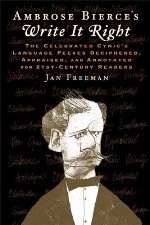 People use words incorrectly all the time. I do it, you do it; Ambrose Bierce himself assures us that he is not exempt either. But in Write it Right, he takes it upon himself to at least put forward the best foot on a correct use of English words. Appraised and checked against our changing society, the readers gets a look at his grammatical peeves as well as true grievances against the English language. This makes a great companion for Strunk and White's Elements of Style. But even if you get it wrong, don't fret. Bierce, Strunk, and White are out there to help us, and as the writer of Sheldon Comics said, English is a language carefully cobbled together by three blind dudes and a German dictionary.
People use words incorrectly all the time. I do it, you do it; Ambrose Bierce himself assures us that he is not exempt either. But in Write it Right, he takes it upon himself to at least put forward the best foot on a correct use of English words. Appraised and checked against our changing society, the readers gets a look at his grammatical peeves as well as true grievances against the English language. This makes a great companion for Strunk and White's Elements of Style. But even if you get it wrong, don't fret. Bierce, Strunk, and White are out there to help us, and as the writer of Sheldon Comics said, English is a language carefully cobbled together by three blind dudes and a German dictionary.
 "History will be kind to me, for I intend to write it." This was very clever of Churchill; and really, isn't that what historians have always done? I challenge you to introduce me to a wholly unbiased historian. But Churchill, with his pointed wit, admitted to his amusing crime; and, indeed, history has been kind to him. My parents gave Tim a nice old copy of The New World for Christmas with lovely large print (I hate reading small print); it's beautifully hard-bound with Churchill's signature scrawled in gold on the front. I wonder if they had me in mind too, for this volume covers the English Civil War, an era I was most interested in when I was, oh, twelvishly-thirteen. I still am, but I try not to be quite so outwardly obsessed because then people laugh at me.
"History will be kind to me, for I intend to write it." This was very clever of Churchill; and really, isn't that what historians have always done? I challenge you to introduce me to a wholly unbiased historian. But Churchill, with his pointed wit, admitted to his amusing crime; and, indeed, history has been kind to him. My parents gave Tim a nice old copy of The New World for Christmas with lovely large print (I hate reading small print); it's beautifully hard-bound with Churchill's signature scrawled in gold on the front. I wonder if they had me in mind too, for this volume covers the English Civil War, an era I was most interested in when I was, oh, twelvishly-thirteen. I still am, but I try not to be quite so outwardly obsessed because then people laugh at me.
So nine lovely books, all just waiting for me to read them. Unfortunately, I have several I am already reading, and several I had planned to read after I was done with those. Aaah, the list just keeps on growing! Maybe I'll ditch all and make a post later on what I'm writing. Except that my brain decided to take a sabbatical and I'm not writing anything at the moment. Bad, naughty Jenny. Scribbles! Scribbles and inkstains!
But that's all boring stuff that no one wants to hear about from me. "Where's the writing? Where's the news on these books your post title seems so keen about? Get on with it, Jenny. Are you having us on?" All right, all right, here I get. You know how much I love talking about books. Here is what I got (or what my husband Tim got, which is more or less the same thing).
 My dear friend Anna sent me a lovely Puritan Paperback copy of Richard Sibbes' Glorious Freedom. We both have fond memories of this book, though mine are by proxy at the moment since I haven't read it yet. Over the summer she spent time with her grandmother, and she would often spend the hour sitting on the porch with one of my letters and Mr Sibbes, hours of bliss and sunshine. So though this isn't the exact book, its pages are infused with the memories of letters and sunshine and maybe even whiffs of tea. She wrote as much (and more, but such things are too precious to tell to all) in the inside flap of my book so that, years from now when I have passed on and my book has not, someone will pick it up and read it and wonder "Who were these young women, and what did they mean, and what were these glimpses of heaven that they caught between the lines of each other's letters?" Such is the power of the written word.
My dear friend Anna sent me a lovely Puritan Paperback copy of Richard Sibbes' Glorious Freedom. We both have fond memories of this book, though mine are by proxy at the moment since I haven't read it yet. Over the summer she spent time with her grandmother, and she would often spend the hour sitting on the porch with one of my letters and Mr Sibbes, hours of bliss and sunshine. So though this isn't the exact book, its pages are infused with the memories of letters and sunshine and maybe even whiffs of tea. She wrote as much (and more, but such things are too precious to tell to all) in the inside flap of my book so that, years from now when I have passed on and my book has not, someone will pick it up and read it and wonder "Who were these young women, and what did they mean, and what were these glimpses of heaven that they caught between the lines of each other's letters?" Such is the power of the written word. Another lovely vintage book I received was this, The Country Diary of an Edwardian Lady. It may be recalled that I have been researching British plants through the help of W. Keble Martin's The Concise British Flora in Colour. Well! Given even a passing knowledge of the expansive and wild glory of a British landscape, even the most forbidding, it is hardly surprising that a young lady such as Edith Holden could contrive to put such lovely observations and illustrations on paper. She filled this book up on observations throughout the year, jotting down what was blooming when, where, giving charming paintings to aid the words in bringing the Edwardian countryside to life. She wrote down many poems which suited the occasion, and even included many local observations on the months, such as their more ancient origin of name and various local festivities. For a girl of my interests, it was just the thing. Also, the book is elderly and smells of deliciousness.
Another lovely vintage book I received was this, The Country Diary of an Edwardian Lady. It may be recalled that I have been researching British plants through the help of W. Keble Martin's The Concise British Flora in Colour. Well! Given even a passing knowledge of the expansive and wild glory of a British landscape, even the most forbidding, it is hardly surprising that a young lady such as Edith Holden could contrive to put such lovely observations and illustrations on paper. She filled this book up on observations throughout the year, jotting down what was blooming when, where, giving charming paintings to aid the words in bringing the Edwardian countryside to life. She wrote down many poems which suited the occasion, and even included many local observations on the months, such as their more ancient origin of name and various local festivities. For a girl of my interests, it was just the thing. Also, the book is elderly and smells of deliciousness. I am sure it has come up that I am reading Charles Spurgeon's Morning by Morning. For Christmas, I got a gorgeous little black leather bound copy of both Morning by Morning and Evening by Evening. I am still only reading the morning bit, because I read my Bible in the evening before bed and by the time I being my landing cycle, it's already late. I will most likely switch once I have finished the morning readings. All the same, I had been wanting Evening by Evening, and now I've got both - all the more felicitous because my copy of Morning by Morning is my mother's, not mine. I am not usually one for 'devotions', as it were, for they so easily become a sort of rite for the soul. But Spurgeon, at least, has designs to focus the wayward soul upon the Constant of Christ, so that when we rise up and when we lie down we will be fixed on him always, and keep his words in our hearts. My thanks go to my in-laws and to Mr Spurgeon himself.
I am sure it has come up that I am reading Charles Spurgeon's Morning by Morning. For Christmas, I got a gorgeous little black leather bound copy of both Morning by Morning and Evening by Evening. I am still only reading the morning bit, because I read my Bible in the evening before bed and by the time I being my landing cycle, it's already late. I will most likely switch once I have finished the morning readings. All the same, I had been wanting Evening by Evening, and now I've got both - all the more felicitous because my copy of Morning by Morning is my mother's, not mine. I am not usually one for 'devotions', as it were, for they so easily become a sort of rite for the soul. But Spurgeon, at least, has designs to focus the wayward soul upon the Constant of Christ, so that when we rise up and when we lie down we will be fixed on him always, and keep his words in our hearts. My thanks go to my in-laws and to Mr Spurgeon himself. A lot of people are put off by the little word 'logic.' Why? Because it hurts, that's why. When we think of logic, we think of painfully intricate syllogisms and Augustine's The Immortality of the Soul and lengthy treatises on mental constructs that no one can understand. But what people often fail to realize is that logic is universal and universally applied. But it isn't universally applied correctly, and that's the problem. Anyone will have heard someone say, "You're being illogical!" and that's because we all fundamentally have an understanding of what logic is, and recognize it when it's being used incorrectly - or even not at all. But Mr Clark, thank goodness, brings the whole thing to the surface so we can look at it properly and have a conscious idea of proper logic. This is one of my husband's Christmas presents, but I wanted it just as much as he. Who knows? When I'm done reading The Hobbit aloud, we may do something unutterably boring like read aloud Logic. Welcome to the Freitag household.
A lot of people are put off by the little word 'logic.' Why? Because it hurts, that's why. When we think of logic, we think of painfully intricate syllogisms and Augustine's The Immortality of the Soul and lengthy treatises on mental constructs that no one can understand. But what people often fail to realize is that logic is universal and universally applied. But it isn't universally applied correctly, and that's the problem. Anyone will have heard someone say, "You're being illogical!" and that's because we all fundamentally have an understanding of what logic is, and recognize it when it's being used incorrectly - or even not at all. But Mr Clark, thank goodness, brings the whole thing to the surface so we can look at it properly and have a conscious idea of proper logic. This is one of my husband's Christmas presents, but I wanted it just as much as he. Who knows? When I'm done reading The Hobbit aloud, we may do something unutterably boring like read aloud Logic. Welcome to the Freitag household. Because yours truly just isn't weird enough! Introducing a gift from my husband, The Element Encyclopedia of Magical Creatures: just about every mythically creepy-crawly you can imagine is indexed in these pages, cross-referenced, bagged and tagged and scribbled down. I'm not sure I want to be known as the people who spent the time tracking all this down, but as a writer I am certainly indebted to the authors. Not only does the book include a cover-to-cover index on mythical creatures, the authors also put in excerpts on the more prominent instances in which these creatures cropped up in history, as well as excerpts on human interaction, or worship, or whatever. Though I doubt I will read it cover to cover myself, it will be an excellent reference book for future knowledge and future stories. Thank you, Tim!
Because yours truly just isn't weird enough! Introducing a gift from my husband, The Element Encyclopedia of Magical Creatures: just about every mythically creepy-crawly you can imagine is indexed in these pages, cross-referenced, bagged and tagged and scribbled down. I'm not sure I want to be known as the people who spent the time tracking all this down, but as a writer I am certainly indebted to the authors. Not only does the book include a cover-to-cover index on mythical creatures, the authors also put in excerpts on the more prominent instances in which these creatures cropped up in history, as well as excerpts on human interaction, or worship, or whatever. Though I doubt I will read it cover to cover myself, it will be an excellent reference book for future knowledge and future stories. Thank you, Tim! No, this is not the exact replica of the copy I possess, but it sure looks nice. I think this is probably the first bit of Eastern epic poetry I've got (I haven't even got the Epic of Gilgamesh - bad Jenny!) so this is new for me. Thankfully we covered Eastern philosophies in philosophy class, so I have at least an idea of what fundamental ideas I will be coming across. As far as the poetry itself is concerned, Edward FitzGerald did a lovely job translating.
No, this is not the exact replica of the copy I possess, but it sure looks nice. I think this is probably the first bit of Eastern epic poetry I've got (I haven't even got the Epic of Gilgamesh - bad Jenny!) so this is new for me. Thankfully we covered Eastern philosophies in philosophy class, so I have at least an idea of what fundamental ideas I will be coming across. As far as the poetry itself is concerned, Edward FitzGerald did a lovely job translating.Awake! for Morning in the Bowl of Night
Has flung the Stone that puts the Stars to Flight:
And lo! the Hunter of the East has caught
The Sultan's Turret in a Noose of Light.
What lovely opening lines! Abigail, who gave it to me, was cheeky enough to scribble on the inside flap "To Jenny - I'm sure you can make sense of it!"
 Please excuse the crookidariness of this photo. Barnes and Noble doesn't understand how do to mugshots. Anyway, for long and long I've had the entire boxed set of The Chronicles of Narnia, very well used and being to come woefully apart. Now, there is something very endearing about a falling-apart book. It shows that it was loved, that it was well-read, that people really cared about its story. But after a while, like the Velveteen Rabbit, it just gets too impractical to try reading out of such torn volumes. I still have the boxed set, and I hope to always have the boxed set, but goodness knows it is a relief to have something I know won't fall to tinder in my hands. Not only that, this copy is simply gorgeous, rife with Pauline Baynes' illustrations, some of which did not make it into my boxed set.
Please excuse the crookidariness of this photo. Barnes and Noble doesn't understand how do to mugshots. Anyway, for long and long I've had the entire boxed set of The Chronicles of Narnia, very well used and being to come woefully apart. Now, there is something very endearing about a falling-apart book. It shows that it was loved, that it was well-read, that people really cared about its story. But after a while, like the Velveteen Rabbit, it just gets too impractical to try reading out of such torn volumes. I still have the boxed set, and I hope to always have the boxed set, but goodness knows it is a relief to have something I know won't fall to tinder in my hands. Not only that, this copy is simply gorgeous, rife with Pauline Baynes' illustrations, some of which did not make it into my boxed set. People use words incorrectly all the time. I do it, you do it; Ambrose Bierce himself assures us that he is not exempt either. But in Write it Right, he takes it upon himself to at least put forward the best foot on a correct use of English words. Appraised and checked against our changing society, the readers gets a look at his grammatical peeves as well as true grievances against the English language. This makes a great companion for Strunk and White's Elements of Style. But even if you get it wrong, don't fret. Bierce, Strunk, and White are out there to help us, and as the writer of Sheldon Comics said, English is a language carefully cobbled together by three blind dudes and a German dictionary.
People use words incorrectly all the time. I do it, you do it; Ambrose Bierce himself assures us that he is not exempt either. But in Write it Right, he takes it upon himself to at least put forward the best foot on a correct use of English words. Appraised and checked against our changing society, the readers gets a look at his grammatical peeves as well as true grievances against the English language. This makes a great companion for Strunk and White's Elements of Style. But even if you get it wrong, don't fret. Bierce, Strunk, and White are out there to help us, and as the writer of Sheldon Comics said, English is a language carefully cobbled together by three blind dudes and a German dictionary. "History will be kind to me, for I intend to write it." This was very clever of Churchill; and really, isn't that what historians have always done? I challenge you to introduce me to a wholly unbiased historian. But Churchill, with his pointed wit, admitted to his amusing crime; and, indeed, history has been kind to him. My parents gave Tim a nice old copy of The New World for Christmas with lovely large print (I hate reading small print); it's beautifully hard-bound with Churchill's signature scrawled in gold on the front. I wonder if they had me in mind too, for this volume covers the English Civil War, an era I was most interested in when I was, oh, twelvishly-thirteen. I still am, but I try not to be quite so outwardly obsessed because then people laugh at me.
"History will be kind to me, for I intend to write it." This was very clever of Churchill; and really, isn't that what historians have always done? I challenge you to introduce me to a wholly unbiased historian. But Churchill, with his pointed wit, admitted to his amusing crime; and, indeed, history has been kind to him. My parents gave Tim a nice old copy of The New World for Christmas with lovely large print (I hate reading small print); it's beautifully hard-bound with Churchill's signature scrawled in gold on the front. I wonder if they had me in mind too, for this volume covers the English Civil War, an era I was most interested in when I was, oh, twelvishly-thirteen. I still am, but I try not to be quite so outwardly obsessed because then people laugh at me.So nine lovely books, all just waiting for me to read them. Unfortunately, I have several I am already reading, and several I had planned to read after I was done with those. Aaah, the list just keeps on growing! Maybe I'll ditch all and make a post later on what I'm writing. Except that my brain decided to take a sabbatical and I'm not writing anything at the moment. Bad, naughty Jenny. Scribbles! Scribbles and inkstains!
Published on December 27, 2010 06:46
December 18, 2010
Another Day In the Life of a New Author
 As Abigail said over on Scribbles and Ink Stains, yesterday evening was a success. Not only did we each sell a sizable number of books ourselves, Barnes and Noble was kind enough to have us sign the books that were left, and the store bought them. Thank you, Barnes and Noble! Thank you, numerous people who came by and picked up our books! The evening was long but definitely worth it, and I hope you all enjoy the books your bought. Merry Christmas!
As Abigail said over on Scribbles and Ink Stains, yesterday evening was a success. Not only did we each sell a sizable number of books ourselves, Barnes and Noble was kind enough to have us sign the books that were left, and the store bought them. Thank you, Barnes and Noble! Thank you, numerous people who came by and picked up our books! The evening was long but definitely worth it, and I hope you all enjoy the books your bought. Merry Christmas!This evening is an hour-long launch party and book signing at our local Spill the Beans downtown. (If you live in Greenville and don't know where it is exactly, it's on South Main squdged up against the Falls Park patio - really cute set up and very cosy). Buy a book, and you get a free coffee! If you don't like coffee, Bi-Lo sells some nice Twinings tea which is equally as good combined with a novel in some warm corner of your home. (I love you, Twinings...!)
So drop on by! Falls Park is gorgeous in the evening, regardless of the cold, and Main Street all lit up during the holiday season is enough to warm Scrooge's heart. Come warm your hands around a free cup of coffee and chit-chat with two young authors. Merry, merry Christmas!
Published on December 18, 2010 10:35



